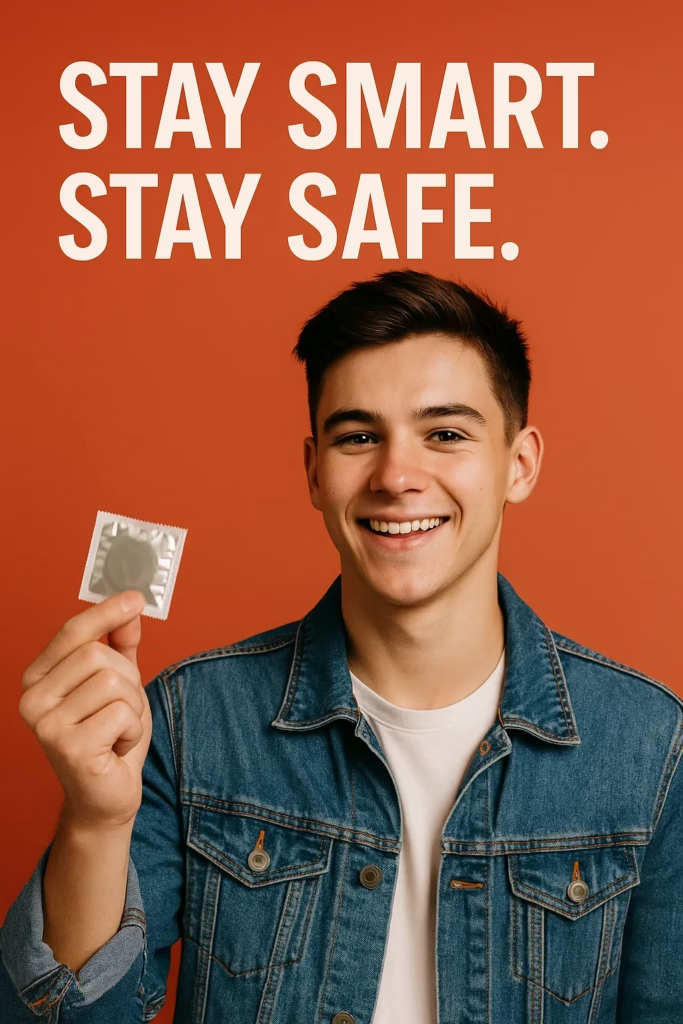Every Teen Guy Should Know About Safe Sex!
Growing up, there’s a lot of advice flying around — but when it comes to safe sex, many important facts get missed. Whether you’re thinking about it or just want to be prepared for the future, here’s what every young guy should know to stay healthy, confident, and responsible.
Safe Sex Tips for Teen Boys: 10 Must-Know Facts for Staying Protected

1. Condoms Are Your Best Friend
Condoms aren’t just for preventing pregnancy — they are your first line of defense against sexually transmitted infections (STIs) like chlamydia, gonorrhea, and HIV.
2. You Can Catch an STI Even Without Sex
Many STIs spread through skin-to-skin contact, not just through intercourse. Protection matters even during oral sex or other intimate contact.
3. Pulling Out Is Not a Safe Plan
Withdrawal (pulling out) before ejaculation is risky. Pre-ejaculate fluid can still contain sperm and STIs. Always use protection.
4. Birth Control Isn’t Just Her Job
While there are many female contraceptive methods like pills or IUDs, using a condom shows respect, responsibility, and care.
5. You Should Get Tested Regularly
Even if you feel fine, some STIs don’t show symptoms early on. A simple test can protect you and your partner.
6. Consent Is Everything
Consent must be clear, enthusiastic, and ongoing. It’s not just about legality — it’s about respect and trust.
7. Alcohol and Drugs Can Cloud Your Judgment
Being under the influence can make it harder to make smart decisions about protection and consent. Stay aware.

8. Talk to Your Partner Before Things Get Intimate
Honest conversations about protection, boundaries, and expectations build trust and make experiences safer and more enjoyable.
9. Emergency Contraception Exists
If something goes wrong (like a broken condom), emergency contraception can prevent pregnancy — but it should be used as soon as possible.
10. Taking Care of Your Sexual Health Is Normal
It’s normal — and smart — to care about your sexual health. Seeing a doctor for advice, vaccinations (like the HPV vaccine), and tests is just good self-care.
Final Thoughts
Learning about safe sex early puts you in control of your health, relationships, and future. It’s not about fear — it’s about freedom, confidence, and respect.
If you have any concerns or questions, don’t hesitate to talk to a healthcare provider. Taking charge of your sexual wellness now is a move you’ll thank yourself for later!
Did You Know?
- You can get some STIs like herpes or HPV even when using condoms — though condoms still reduce risk by over 80%!
- The HPV vaccine is recommended for boys too — and it can prevent certain cancers later in life.
- Some STIs show no symptoms at all — you might have one and not even know it without regular testing.
- Emergency contraception (like Plan B) works best within 72 hours but can still be effective up to 5 days after unprotected sex.
- Using lube with condoms not only feels better but also reduces the risk of the condom breaking.
FAQs (Frequently Asked Questions)
Q1. At what age should a guy start thinking about safe sex?
A: It’s never too early to learn about safe sex. Even before becoming sexually active, understanding protection, consent, and health is important for making smart choices.
Q2. Are condoms 100% effective at preventing pregnancy and STIs?
A: No method is 100% effective, but condoms are about 98% effective with perfect use. They also provide strong protection against most STIs when used correctly.
Q3. Do I need to get tested if I have no symptoms?
A: Yes! Many STIs have no early symptoms. Regular testing is the best way to stay healthy and protect your partner too.
Q4. What should I do if a condom breaks during sex?
A: Stop immediately, use a new condom, and consider emergency contraception if there’s a risk of pregnancy. Also, talk to a healthcare provider about STI testing.
Q5. How do I bring up safe sex with my partner without making it awkward?
A: Be honest and respectful. You could say, “I care about both of us and want to make sure we’re safe. Can we talk about protection?”
हिंदी Translation:
लड़कों के लिए – 10 बातें जो सेफ सेक्स के बारे में आपको कोई नहीं बताता
बड़े होते वक्त बहुत सारी बातें सुनने को मिलती हैं — लेकिन जब बात सेफ सेक्स की आती है, तो कुछ ज़रूरी बातें अक्सर छूट जाती हैं।
चाहे आप अभी इस बारे में सोच रहे हों या बस सही जानकारी रखना चाहते हों, ये 10 बातें हर लड़के को पता होनी चाहिए ताकि आप हमेशा हेल्दी और जिम्मेदार रहें।
1. कंडोम आपका सबसे अच्छा दोस्त है
कंडोम सिर्फ प्रेगनेंसी से बचाने के लिए नहीं है — यह आपको सेक्सुअली ट्रांसमिटेड इंफेक्शन (STI) जैसे क्लेमाइडिया, गोनोरिया, और HIV से भी बचाता है।
2. बिना सेक्स के भी STI हो सकता है
कई इंफेक्शन सिर्फ स्किन से स्किन टच से भी फैलते हैं, जरूरी नहीं कि सिर्फ इंटरकोर्स से। ओरल सेक्स या अन्य नज़दीकी के दौरान भी सावधानी ज़रूरी है।
3. पुल-आउट मेथड भरोसेमंद नहीं है
सेक्स के दौरान बाहर निकलने (withdrawal) से भी प्रेगनेंसी या STI का खतरा रहता है। प्री-कम फ्लूइड में भी स्पर्म और इंफेक्शन हो सकते हैं।
4. बर्थ कंट्रोल सिर्फ लड़की की जिम्मेदारी नहीं है
चाहे लड़की ने पिल्स ली हो या IUD लगाया हो, कंडोम का इस्तेमाल करना आपकी भी जिम्मेदारी है। इससे आप जिम्मेदार और केयरिंग पार्टनर बनते हैं।
5. रेगुलर टेस्ट करवाना बहुत ज़रूरी है
भले ही कोई लक्षण न हों, कई बार STI बिना किसी लक्षण के होते हैं। रेगुलर टेस्ट करवा कर आप खुद को और अपने पार्टनर को सुरक्षित रख सकते हैं।
6. कंसेंट सबसे जरूरी है
किसी भी रिश्ते में कंसेंट यानी पार्टनर की साफ और खुशी से दी गई सहमति बेहद जरूरी है। यह सिर्फ लीगल नहीं, बल्कि सम्मान और भरोसे की बात भी है।
7. नशे में सेफ फैसले लेना मुश्किल होता है
अल्कोहल या ड्रग्स लेने के बाद सेफ सेक्स के बारे में सही फैसले लेना कठिन हो सकता है। इसलिए हमेशा होश में रहकर डिसीजन लें।
8. इंटिमेट होने से पहले बात करना ज़रूरी है
सेक्स से पहले अपने पार्टनर से प्रोटेक्शन और लिमिट्स पर खुलकर बात करना रिश्ता मजबूत बनाता है और एक्सपीरियंस को सेफ बनाता है।
9. इमरजेंसी कॉन्ट्रासेप्शन का विकल्प मौजूद है
अगर कभी कंडोम फट जाए या कोई गलती हो जाए, तो इमरजेंसी कॉन्ट्रासेप्शन से प्रेगनेंसी रोकी जा सकती है। लेकिन इसे जल्दी लेना जरूरी है।
10. अपनी सेक्सुअल हेल्थ का ध्यान रखना नॉर्मल है
सेक्सुअल हेल्थ के बारे में सोचना या डॉक्टर से मिलना बिल्कुल नॉर्मल है। चाहे टेस्ट कराना हो या HPV वैक्सीन लेना हो — ये सब आपकी सेहत का हिस्सा है।
आखिरी बातें
सेफ सेक्स की सही जानकारी रखना आपको ज्यादा आज़ाद, कॉन्फिडेंट और जिम्मेदार बनाता है।
डरने की ज़रूरत नहीं है — समझदारी से फैसले लेना आपकी हेल्थ और भविष्य के लिए सबसे अच्छा कदम है।
अगर कोई सवाल या चिंता है, तो डॉक्टर से बात करने में बिल्कुल हिचकिचाएं नहीं। आपकी हेल्थ आपकी सबसे बड़ी जिम्मेदारी है!
क्या आप जानते हैं?
- कंडोम का सही इस्तेमाल इंफेक्शन के खतरे को 80% से ज्यादा घटा सकता है!
- HPV वैक्सीन सिर्फ लड़कियों के लिए नहीं, लड़कों के लिए भी जरूरी है।
- कुछ STI बिना किसी लक्षण के होते हैं, इसलिए टेस्ट करवाना बहुत जरूरी है।
- इमरजेंसी पिल (जैसे Plan B) अगर 72 घंटे में ली जाए तो सबसे ज्यादा असरदार रहती है।
- कंडोम के साथ ल्यूब का इस्तेमाल कंडोम टूटने के खतरे को भी कम करता है।
अक्सर पूछे जाने वाले सवाल
Q1. सेफ सेक्स के बारे में कब सोचना शुरू करना चाहिए?
A: जितनी जल्दी आप सही जानकारी ले लें, उतना अच्छा। यह सिर्फ सेक्स के बारे में नहीं, बल्कि अपनी सेहत और जिम्मेदारी समझने की बात है।
Q2. क्या कंडोम पूरी तरह से प्रेगनेंसी और STIs को रोकते हैं?
A: कोई भी मेथड 100% असरदार नहीं होता, लेकिन सही तरीके से इस्तेमाल करने पर कंडोम 98% तक प्रेगनेंसी और कई STIs से बचाव करते हैं।
Q3. बिना लक्षणों के भी टेस्ट कराना जरूरी है?
A: बिल्कुल! कई इंफेक्शन बिना किसी संकेत के हो सकते हैं। इसलिए रेगुलर टेस्ट सेफ्टी के लिए जरूरी है।
Q4. अगर सेक्स के दौरान कंडोम फट जाए तो क्या करें?
A: तुरंत रुकें, नया कंडोम इस्तेमाल करें और अगर प्रेगनेंसी का रिस्क है तो इमरजेंसी पिल के बारे में डॉक्टर से सलाह लें। STI टेस्ट भी करवाना जरूरी है।
Q5. पार्टनर से सेफ सेक्स के बारे में कैसे बात करें?
A: ईमानदारी और सम्मान के साथ। आप कह सकते हैं, “मैं हमारी सेहत का ध्यान रखना चाहता हूं, क्या हम प्रोटेक्शन के बारे में बात कर सकते हैं?”
Sources & Acknowledgments
This article is based on data from reputable sources, including:
- ClinicalTrials.gov – Providing the latest clinical trial information.
- OpenFDA – Offering reliable drug and medical device data.
We ensure all information is accurate, up-to-date, and aligned with expert-reviewed medical sources. Always consult a healthcare professional for medical advice.